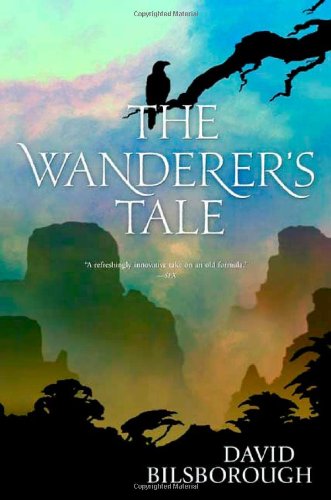
 The Wanderer’s Tale by David Bilsborough
The Wanderer’s Tale by David Bilsborough
Described as an “epic fantasy series in the very best tradition of Tolkien,” The Wanderer’s Tale is an old-school story about a band of misfits embarking on a quest north to Melhus through the land of Lindormyn — populated by many different races, religions, deities and other creatures — to prevent Drauglir, The Evil One, from being resurrected 500 years after he was supposedly slain. Along the way, the travelers get caught up in numerous (mis)adventures as they journey through strange lands and meet up with a menagerie of beasts — ogres, Leucrota, wolves, Huldre, Jaculus, Ganferd, Spriggans, Kobolds, Afanc, giants, etc. — both familiar and terrifying.
Based on the synopsis alone, comparisons to J.R.R. Tolkien are inevitable though there’s actually much more to The Wanderer’s Tale than just another Lord of the Rings clone. True, Tolkien was a major influence in Mr. Bilsborough’s debut, from the main premise to the novel’s prose and the land of Lindormyn, which comes across as very Middle Earth. Yet, the author has cited various other influences such as Dungeons & Dragons, the Silent Hill video game and the British television comedy The League of Gentlemen, all of which have been incorporated into The Wanderer’s Tale in some way.
The end result is a novel that is either trying to make fun of, or reinvent, the traditional ‘quest’ fantasy. This is where the book gets tricky, because I can’t decide what it’s trying to be. On the one hand, The Wanderer’s Tale is a largely stereotypical fantasy that features occasional moments where the author is trying hard to explore a different angle, such as the whole ‘good vs. evil’ scenario, what it means to be a hero, the concept of fate, the ramifications of killing, developing characters and plot in unexpected directions, and so forth. At other times, the book doesn’t seem to take itself seriously at all and reads more like some sort of bad slapstick comedy act.
Whatever it is that Mr. Bilsborough is trying to accomplish, it doesn’t quite work and the main reason is the writing. Basically, Mr. Bilsborough is an author who is biting off more than he can chew in his debut. Stylistically, I thought Mr. Bilsborough did okay in the descriptive department though he tries to be too sophisticated and clever for his own good. Pacing wise, The Wanderer’s Tale is an uneven read that is way too long and would benefit from some tightening up. Plotting is simplistic and it’s pretty easy to guess all of the book’s ‘surprises.’ Atmospherically, the author tries to convey different moods representing horror, suspense, bravery, wonder, etc., but as a reader I was never fully convinced.
Where the book really starts to go wrong however, is the characterization. Whether it was the cookie-cutter protagonists, their shallow developments, the infantile dialogue/musings, their ludicrous interactions with one another, the way that the third-person narratives jumped around haphazardly when there was more than one character involved, or the noticeable lack of any female personalities, the characterization was just substandard at best. Let’s just say that I’ve seen better character development in cheesy RPG videogames — where characterization is not known to be one of the strong points.
Of course, it’s not all bad. Take the world of Lindorymn for example. Sure, it’s very “Tolkienesque” as a whole, but there was a lot of love put into its creation, evidenced by its rich mythology, and there were actually some truly imaginative monsters, cultures and other concepts that were introduced, especially in the latter half of the book. Speaking of which, a little over halfway in, the novel starts following a single viewpoint for several chapters, which I thought were some of the better moments in the book and showed, albeit briefly, that Mr. Bilsborough could write a character as long as that was his main focus.
There were other areas interspersed throughout the book that flashed promise as well, but truth be told, the negatives far outweigh the positives in The Wanderer’s Tale.
In the end, David Bilsborough’s The Wanderer’s Tale is a fantasy that aspired for great things — even though I’m still not sure what that was — but ultimately failed due to poor writing and execution. Yet, I have to give the man some due. Supposedly the author spent twelve years writing The Wanderer’s Tale, after it was originally conceived as a poem at the age of 15. Add to that 130 rejections from agents and another 60 from publishers, and it’s hard not to be impressed with Mr. Bilsborough’s perseverance. Of course, it will probably take that same perseverance for readers just to finish The Wanderer’s Tale in the first place…





I loved this deep dive into Edwige Fenech's Giallo films! Her performances add such a unique flavor to the genre.…
It would give me very great pleasure to personally destroy every single copy of those first two J. J. Abrams…
Agree! And a perfect ending, too.
I may be embarrassing myself by repeating something I already posted here, but Thomas Pynchon has a new novel scheduled…
[…] Tales (Fantasy Literature): John Martin Leahy was born in Washington State in 1886 and, during his five-year career as…